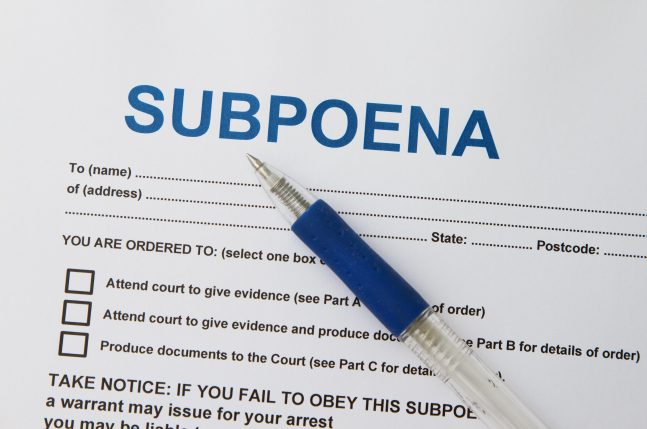
When someone can testify as a witness or has documents relevant to a legal action, a party can ask the Court to issue them with a subpoena. This is a Court order for them to attend Court at a certain time and provide relevant evidence.
A subpoena can be to testify personally (subpoena ad testificandum) or to bring documents to the hearing (subpoena duces tecum) and in many instances, both are required in the same subpoena.
The subpoena will have the Court seal and will clearly mark the address of the Court and the time at which the person summoned must attend. An amount of money to cover the reasonable cost to get to the Court (and back home) should be sent by the party asking for the subpoena to be issued.
It should be served personally a reasonable time before the required attendance (in SA, at least 5 days before).
Because the subpoena is a Court order, a person served must comply. Ignoring the subpoena could cause a visit from the Sheriff to drag you to Court, to answer the subpoena and also perhaps to meet a charge of contempt.
If the subpoena relates to providing documents, it should set out as clearly as possible the document or other thing to be brought to Court. Whilst it is not always possible to identify a precise book, letter, file, computer disc, photo or other papers, the receiver of the subpoena must be able to gather and produce the documents with reasonable certainty of which ones are required.
A person served with a subpoena may have a good reason to object to answer it. An application can be made to set aside the subpoena if it would be improper or inappropriate on a number of grounds. For example, the range of documents sought might be irrelevant, or far too wide and onerous to produce, or based on ‘fishing about’ by a party to an action. Or there may be some legal privilege over the documents that mean they cannot be forcibly produced.
If a subpoena is successfully challenged, either by the person subpoena’d or another party to the legal action, the party applying for the issue of the subpoena may well have to pay the legal costs of challenging the subpoena.
In any case, if you or your company is served with a subpoena, it is good practice to get timely independent legal advice on your obligations and your rights.
For further information please contact Peter on 8362 6400 or email Peter Jakobsen. Join our mailing list to receive updates and advice on current issues.







